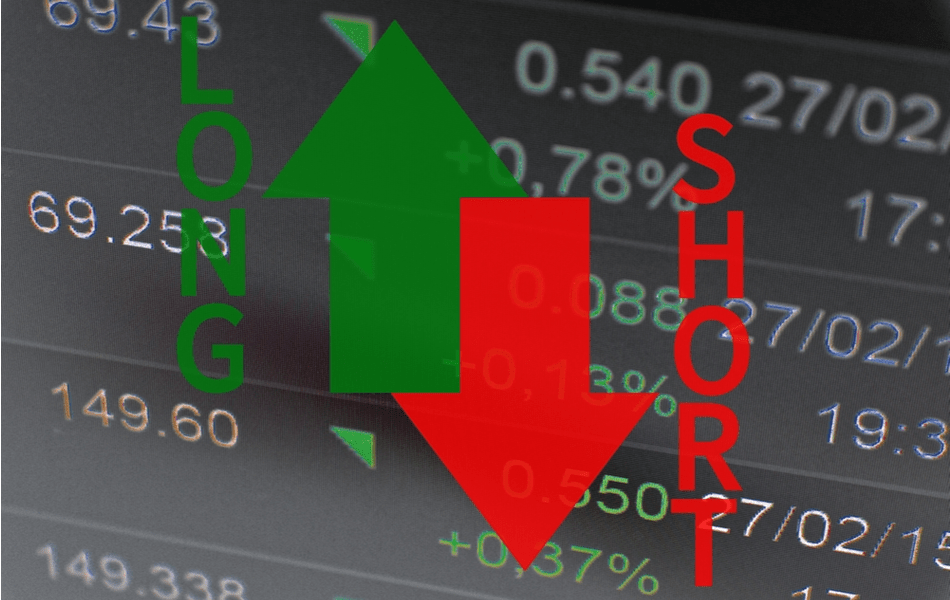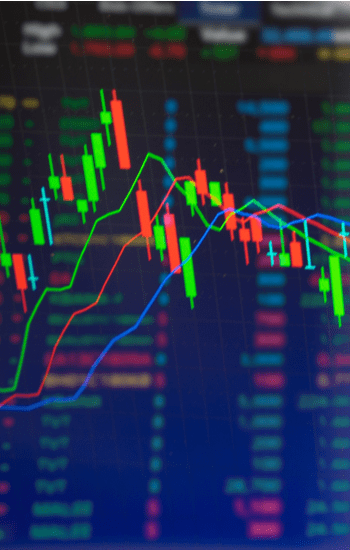Why would you want to trade Forex?
The Forex market is also called the foreign exchange market or FX market and is the place where every currency in the world is bought and sold. This makes it the largest financial market in the world. There are several advantages to trading on this market such as longer trading hours , high liquidity and the ample opportunity to trade on margin . This article explains everything about this market and names a number of advantages to trading on the Forex market.
When you as a trader choose the market you want to trade on, you look at the best conditions to trade in. You want to make as much profit as possible and which market you choose logically depends (partly) on that. Millions of people trade on the Forex market and of course have good reasons for doing so. If you want to know more about trading in Forex, read the following article: ‘ What is Forex trading ‘.
Advantage 1: On the Forex market you can go both short and long
You can go short on all markets using so-called derivatives . These are for example CFDs or options. However, this is always linked to the Forex market because you sell currency X, also known as the quote currency, in order to buy currency Y (the base currency). The amount you pay for this transaction of the currency pair reflects the price of buying one unit of the base currency by selling the quote currency. This may sound a bit vague and that is why you will find an example below.
Imagine the Forex pair GBP/EUR. In this example, the British Pound is the base currency and the Euro is the quote currency. Let’s assume that this pair is at 1.12156. In that case, one British Pound is worth 1.12156 Euro. If you think that the Pound will outperform the Euro in the coming period, i.e. will rise against the Euro, then you invest in this pair and go long. On the other hand, if you expect the Euro to outperform and that the Pound will fall in value against the Euro, then you should sell the pair and go short. Your loss or your profit depends entirely on your prediction of what the currencies are going to do. You can make money regardless of the direction in which the market moves.
Going short can be done easily via CFDs, read more about taking short positions using a CFD.

Advantage 2: The long trading hours on the Forex market
The Forex market gives you the opportunity to trade virtually 24/7. This allows you to trade at very flexible times. The market is open 24 hours a day, 5 days a week. From the Netherlands, you can start on Sunday evening at 10 pm and continue until Friday 11 pm. These hours are much longer than other markets. This is because transactions on this market can be done directly between two parties. This is also called an OTC, an ‘over the counter’. In addition, this market is of course traded all over the world and the different time zones must be taken into account. This allows you to take advantage of the different sessions of the trading hours on the Forex market. Do not forget that the times change due to the transition from winter time to summer time and vice versa.
Is there also trading on the Forex market during the weekend?
That is a very useful and legitimate question. The answer for the retail investor is no. Only because of the different time zones you can trade in the Netherlands for two hours on Sunday evening. Furthermore, Central Banks can trade in the weekend and therefore prices can change during the weekend. In jargon this is also called ‘gapping’.
This is of course something to keep in mind when you are going to trade on this market. To counter the risks of such a weekend you can use stops and limits. So think about this carefully on Friday evening when the market is going to close for you.
Advantage 3: The large amount of liquidity in Forex
The Forex market holds the largest amount of liquid assets in the world. This makes the market very active as there are a huge number of buyers and sellers who are about to trade. Every day, over 5 trillion dollars in various types of currencies are traded by banks, companies, but also by individual traders. The vast majority of the trades are aimed at making a profit.
The high degree of liquidity in the Forex market provides an easy environment for trading. This leads to low transaction costs. This allows traders to speculate on market movements of just a few pips.
Advantage 4: Huge price volatility in the Forex market
Partly due to the large amount of liquidity, many transactions are made on the Forex market every day. You should think of trading billions of dollars per minute. Because of this, you see a lot of price changes in the value of the different currencies. In short, the currencies are very volatile.
You can use this volatility . If you speculate on the right direction of the market, you can make a huge margin on an investment within a few minutes. However, this works both ways. If you bet on the wrong direction, you can also lose a lot of money in one go. Fortunately, there are various risk management tools to protect you against these types of risks. Furthermore, it is very important that you immerse yourself in the technical operation of the value changes of currencies so that you can predict the movements of the market well.

Benefit 5: Use leverage to make a big profit without a big investment
On the Forex market, you can usually trade in two ways, namely with options and CFDs . With both methods, you can use leverage. This means that you can book a larger profit (or loss) with a small investment. You open a position on the market without paying fully for this position. The full value is later deducted from your profit. If you make a loss, you still have to pay the value that you initially did not pay.
For example, you are going to make a CFD transaction in the EUR/GBP currency pair. You are going to use leverage and you only pay 3.33% of the actual value of your transaction. You then make a profit when you sell your position again. The remaining 96.66% of the original value, which you had not yet paid, you now offset with the profit. This way you book a profit without a large investment.
However, you should realize that you can also make a loss and then also have to pay the original value. Before using leverage, consider whether you can handle the transaction financially.
Advantage 6: A wide choice of currency pairs
On the Forex market, almost all possible currency pairs can be traded. This gives you a huge amount of choice. You can make predictions based on everything that happens in the world and play on the relationships between large and small economies. You can also delve into a certain region and then start trading in this currency.

Advantage 7: Hedging in the Forex market
You could just read that you can earn a lot of money through the volatility of the Forex market. However, you can also make a lot of losses. To limit the risks, you can use hedging. This is a technique to limit the risks of a price movement that is not in your favor. You open a number of positions based on strategy to protect yourself. In this way, you can limit your possible losses through hedging.
The most used hedging technique on the Forex market is trading in different currency pairs. You do not invest in positively related pairs, which fall or rise with each other, but rather opposite pairs. When one falls, the other rises and so you can limit your losses. A short position on the EURO and Dollar pair protects you against a long investment on the Pound with Dollar.
You can also use the Forex market as a hedge technique to protect yourself on other markets. When certain commodities, in which you have invested, fall or rise, you will see this reflected on the currency market. For example, you can use the USD/CAD pair to protect yourself against falling oil prices.
Why would you prefer to trade Forex instead of, for example, shares?
To determine whether you would rather trade Forex than stocks, you need to have a good idea of whether the advantages of this market are interesting to you. The advantages are mentioned again below. Do not only look carefully at the possibilities to make a profit, but also at the risks. Are you very susceptible to these risks? Or do you know well how you can protect yourself against the risks?
- The Forex market has much longer opening hours than the stock market. You can trade whenever it suits you. However, this also means that you have to keep a close eye on the market 24 hours a day. Pay close attention to your positions on Friday evening. Changes can occur during the weekend, while you cannot trade then.
- The Forex market has an unprecedented amount of liquidity. 5 trillion dollars are turned over daily. Many more transactions are made than on the stock market and this gives you the opportunity to make margin more easily.
- The Forex market is incredibly volatile, especially compared to the stock market. Thanks to this volatility, you can make a huge margin on a small position in the short term. Prices can also quickly develop to your disadvantage. Make sure you protect yourself well against this.
All in all, it is up to you to decide whether you are a suitable trader for this market. Read more about Forex and delve into the developments of the currency market.
Compare brokers and start investing in Forex
Are you excited about investing in Forex after reading this article? Start comparing and find the broker that suits you best!